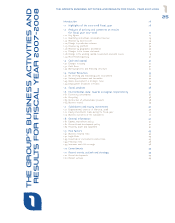Ubisoft 2007 Annual Report Download - page 38
Download and view the complete annual report
Please find page 38 of the 2007 Ubisoft annual report below. You can navigate through the pages in the report by either clicking on the pages listed below, or by using the keyword search tool below to find specific information within the annual report.
UBISOFT • FINANCIAL REPORT 2008
More broadly, the open nature of the work environment
remains a strength of the Group’s culture, as expressed by
94% of employees in the most recent internal survey.
Valuing
performance and
innovation
1.4.2.1 Internal creative workforce
driving innovation
Despite a very competitive labor market, Ubisoft actively
pursued its organic growth strategy with 389 employees
joining the Group during fiscal year 2007-2008.
Headcount has risen 45% over the past three years.
Ubisoft has the industry’s second largest internal creative
workforce. The strategic international locations of its 18
production sites mean that the Company can attract lea-
ding experts from all corners of the globe. Having deve-
lopment studios in-house guarantees the quality of the
games produced and makes the Group responsive and fle-
xible, which are major assets. Our teams have thus been
amongst the first to be positioned in the Games for
Everyone segment to offer consumers titles that match
what they are looking for.
The Group also spurred its organic growth by establishing
and acquiring studios that offer ambitious growth poten-
tial. Thus, Ubisoft’s growth was underpinned by the acqui-
sition of the Digital Kids studio in Japan and the opening of
the Singapore and Chengdu studios. In April 2008, the
Group announced the acquisition of a studio in Pune, India,
as well as the opening of a studio in Kiev, Ukraine.
Furthermore, Ubisoft added to its partnership agreements
with universities in order to attract, train and retain the
best recruits in the video game industry. Accordingly, the
Group can draw from its Campus in Montreal. Since its
founding in May 2005, the number of applicants and stu-
dents has risen every year and the programs offered have
been enhanced. The most recent class had over 200 stu-
dents who were able to take advantage of a newly added
curriculum on Sound Design in addition to the existing
training courses. On the strength of the success of this ini-
tial experiment, Ubisoft also launched a Campus in
Morocco in October 2008.
Ubisoft ensures that new teams are trained and integrated
into an environment that transmits the Group’s culture
and which places increasing importance on creativity and
innovation.
1.4.2.2 Autonomy and initiative
at personal level
Employees enjoy significant autonomy in their work, as
demonstrated by the results of the most recent internal
survey in which 91% of them stated that they feel they are
able to take the initiative in their work on a daily basis.
The work practices used strongly encourage the involve-
ment and contribution of employees. Production methods
are constantly evolving and guarantee a work environment
that encourages innovative ideas, initiative and empower-
ment of the teams.
1.4.2.3 Compensation that aims to recognize
performance and commitment
Ubisoft has established a bonus policy that reflects its
desire to reward personal and collective performance:
the production teams receive a bonus that is calculated
on the basis of the profitability of the game on which
they worked and their individual contribution;
the business teams receive a bonus calculated on the
basis of achieving quantifiable results set at the begin-
ning of the year.
Furthermore, employee shareholding is an excellent
means for Ubisoft to share the Company’s success with all
of its employees. Capital increases reserved for employees
have taken place in France on a regular basis since 2001, in
the US in September 2006 and in Canada in July 2007.
Capital increases reserved for employees of the Canadian,
French, US, Romanian, British and German subsidiaries
are scheduled between now and September 2008.
Overall, the total of registered shares held by employees(2)
or indirectly through an FCPE (company mutual fund)
amounted to 1.3% of the capital.
Lastly, stock options are awarded on a discretionary basis
to employees who have consistently exceeded performance
expectations. Taking all plans together, as of March 31,
2008, nearly 16% of the Group’s employees have received
such options.
Skills development:
a strategic focus
1.4.3.1 Innovative training programs
tailored to needs
In a sector where innovation is relentless, technological
advances and expertise are key. Naturally, all forms of
training are a key priority.
Video gaming is a new business, and training programs tai-
lored to its constant changes are in very large part pro-
vided internally, including through on the job training.
Training programs are mainly organized at a local level,
and are occasionally organized internationally for certain
areas of expertise. Excluding on the job training, the trai-
ning programs provided during fiscal year 2007-2008 can
be summarized as follows:
the budget allocated to training (excluding salaries)
amounted to €1,695,989 over the period;
6,598 days of training were provided within the Group,
representing an annual average of 1.6 days per
employee;
(2) Estimate made on the basis of the information available as of March 31,
2008.
1.4.3
1.4.2
























